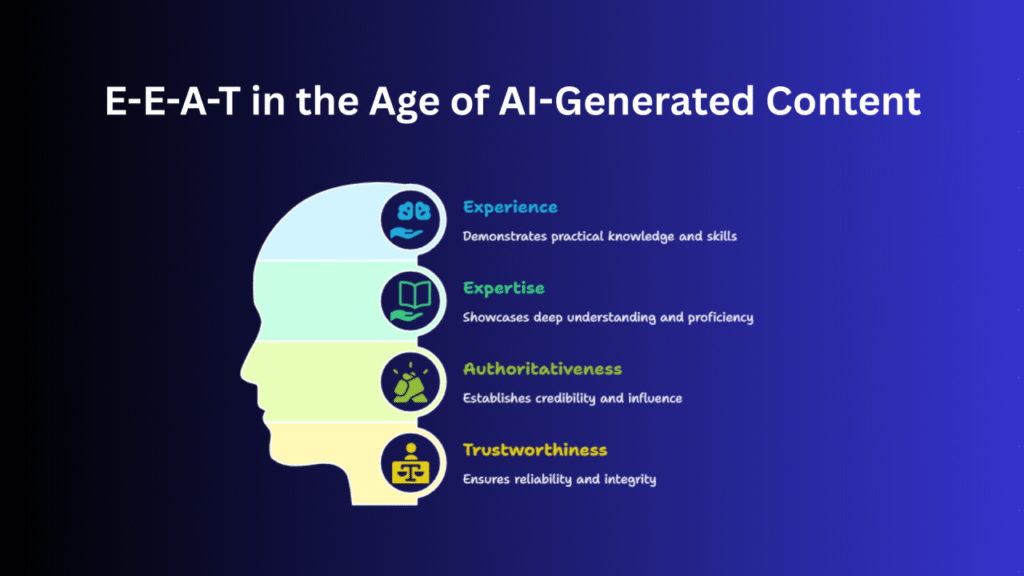
In the ever-evolving digital landscape, content quality has become more than just a buzzword—it’s a necessity. As search engines and AI tools grow more sophisticated, the criteria for ranking and visibility have shifted dramatically. At the heart of this transformation lies E-E-A-T: Experience, Expertise, Authoritativeness, and Trustworthiness. Originally introduced by Google to evaluate content quality, E-E-A-T has now taken on new dimensions with the increasing use of AI in content creation, curation, and evaluation.
This blog explores how E-E-A-T is being redefined in the age of artificial intelligence, and what content creators, marketers, and businesses must do to stay relevant and credible.
What Is E-E-A-T?
E-E-A-T stands for:
- Experience: Does the content reflect first-hand knowledge or personal involvement?
- Expertise: Is the creator qualified or knowledgeable in the subject matter?
- Authoritativeness: Is the source recognized as a leader or trusted voice in the field?
- Trustworthiness: Can users rely on the accuracy, transparency, and integrity of the content?
These principles guide search engines in determining which content deserves to be surfaced in top results. But with the growing use of AI, the way these signals are interpreted—and even generated—is changing.
The Impact of AI on E-E-A-T
The use of AI has revolutionized how content is produced and consumed. From generative models like ChatGPT and Copilot to AI-powered search engines, artificial intelligence is now central to the digital experience. But this raises critical questions:
- Can AI-generated content demonstrate real experience?
- How do we measure expertise when the author is a machine?
- What makes AI content authoritative or trustworthy?
Let’s unpack each E-E-A-T pillar in the context of AI.
Experience: Can AI Simulate First-Hand Knowledge?

Experience is traditionally rooted in human interaction—someone who’s lived through a situation, used a product, or solved a problem. The use of AI challenges this notion. AI can synthesize millions of data points, but it doesn’t “experience” anything in the human sense.
However, AI can amplify human experience. For example:
- AI tools can summarize user reviews to reflect collective experience.
- Content creators can use AI to enhance their own narratives with data-driven insights.
- Businesses can combine AI-generated content with real testimonials or case studies.
To maintain E-E-A-T, it’s essential to clearly distinguish between AI-generated summaries and authentic human experiences.
Expertise: Human Knowledge vs. Machine Intelligence
Expertise is about depth of understanding. While AI can mimic expertise by pulling from vast knowledge bases, it lacks the nuanced judgment of a true expert. The use of AI in content creation must be guided by human oversight to ensure accuracy and relevance.
Best practices include:
- Citing human experts in AI-generated content.
- Using AI to assist—not replace—subject matter experts.
- Ensuring that AI outputs are reviewed and validated by qualified professionals.
In short, AI can support expertise, but it shouldn’t be the sole source of it.
Authoritativeness: Building Credibility in an AI-Driven World
Authoritativeness is earned through recognition and reputation. The use of AI can help elevate authoritative voices by amplifying their reach, but it can also blur the lines between credible sources and synthetic content.
To preserve authority:
- AI-generated content should link to reputable sources.
- Brands should maintain consistent messaging across human and AI channels.
- Verified credentials and affiliations should be clearly displayed.
AI can be a powerful tool for distributing authoritative content—but only if it’s grounded in genuine credibility.
Trustworthiness: Transparency in the Age of Automation
Trust is the cornerstone of digital engagement. With the use of AI becoming more prevalent, transparency is more important than ever. Users need to know:
- Who created the content?
- Was AI involved in its production?
- Is the information accurate and unbiased?
To build trust:
- Disclose when content is AI-generated or AI-assisted.
- Include fact-checking and source attribution.
- Use secure platforms and ethical data practices.
Trustworthiness in the age of AI isn’t just about content—it’s about the entire ecosystem of creation, delivery, and interaction.
How Search Engines Evaluate E-E-A-T with AI
Search engines are increasingly using AI to evaluate E-E-A-T signals. This includes:
- Natural language processing to assess tone and clarity.
- Machine learning to detect misinformation or bias.
- Semantic analysis to determine relevance and depth.
The use of AI in search evaluation means that content must be not only high-quality but also machine-readable. Structured data, schema markup, and semantic richness are now essential for visibility.
Practical Tips for Maintaining E-E-A-T with AI
Here’s how to ensure your content meets E-E-A-T standards in an AI-driven landscape:
- Blend Human and AI Contributions Use AI to support research and formatting, but keep human insight at the core.
- Be Transparent About AI Use Let users know when AI has been used in content creation or decision-making.
- Cite Reliable Sources Whether human- or AI-generated, content should reference authoritative data.
- Focus on User Intent AI tools can help identify what users are really asking—use that to guide your content.
- Audit Regularly Review AI-generated content for accuracy, tone, and alignment with brand values.
The Future of E-E-A-T and AI
As AI continues to evolve, so will the standards for content quality. The use of AI will become more integrated into every stage of the content lifecycle—from ideation to distribution. But the principles of E-E-A-T will remain vital.
In fact, they may become even more important. In a world where machines can generate endless content, human values—experience, expertise, authority, and trust—will be the differentiators that truly matter.
E-E-A-T isn’t just a framework—it’s a philosophy for creating meaningful, reliable content. In the age of AI, it’s our responsibility to uphold these values, even as we embrace new technologies. The use of AI can enhance content creation, but it must be guided by human judgment, ethical standards, and a commitment to truth.
By aligning AI capabilities with E-E-A-T principles, we can build a digital future that’s not only intelligent—but also trustworthy.